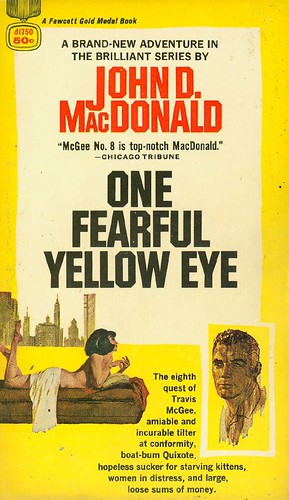Saturday, May 1: Mississippi Mud
ABOARD THE BUSTED FLUSH
by John M. Floyd
I like good titles. The Matarese Circle, The High and the Mighty, “The Gift of the Magi ,” A Walk Among the Tombstones, etc. — to me, those are interesting, and eye-catching.
I also think it’s interesting when an author chooses to follow a pattern with his or her titles. I know it’s mostly a marketing ploy, but it also requires a bit of imagination to keep coming up with “themed” titles without making them sound old, or boring. Or silly.
I am curious (about) yellow
 I especially like the titles in the old Travis McGee mystery series by John D. MacDonald. Each one of them uses a color of some kind, which I think is a great idea. Good writing consists in part of producing images in the mind of the reader (show, don’t tell), and what better way to do that than to provide something that’s easy to visualize, like The Empty Copper Sea, before the reader even turns the first page?
I especially like the titles in the old Travis McGee mystery series by John D. MacDonald. Each one of them uses a color of some kind, which I think is a great idea. Good writing consists in part of producing images in the mind of the reader (show, don’t tell), and what better way to do that than to provide something that’s easy to visualize, like The Empty Copper Sea, before the reader even turns the first page?
At any rate, a “colorful” title came to be a signature of MacDonald’s work, or at least of the McGee series. Here is (I think) a complete list of those novels:
The Deep Blue Goodby (1964)
Nightmare in Pink (1964)
A Purple Place for Dying (1964)
The Quick Red Fox (1964)
A Deadly Shade of Gold (1965)
Bright Orange for the Shroud (1965)
Darker Than Amber (1966)
One Fearful Yellow Eye (1966)
Pale Gray for Guilt (1968)
The Girl in the Plain Brown Wrapper (1969)
Dress Her in Indigo (1969)
The Long Lavender Look (1970)
A Tan and Sandy Silence (1972)
The Scarlet Ruse (1973)
The Turquoise Lament (1974)
The Dreadful Lemon Sky (1975)
The Empty Copper Sea (1978)
The Green Ripper (1980)
Free Fall in Crimson (1981)
Cinnamon Skin (1982)
The Lonely Silver Rain (1985)
No fibbing, about McGee
The series is a little unusual, as mysteries go, because even though it is of course genre fiction (top priority: entertainment), it’s sometimes been referred to as “classy trash,” sort of a beach getaway for the white-collar set. I might not go so far as to call them literary fiction, but some of the views of Travis McGee and his friend Meyer are certainly insightful and thought-provoking, and the characters and settings are unforgettable. How could McGee, a “salvage consultant” who lives on a houseboat that he won in a poker game, not be an interesting and complex character? (He reminds me, now and then, of Lawrence Block’s Matthew Scudder.)
The MacDonald franchise
JDM also wrote many standalones, among them the hurricane novel Condominium; the delightful fantasy The Girl, the Gold Watch, and Everything; and The Executioners, which was twice adapted (in 1962 and 1991) into the film Cape Fear. I’m not sure I like his other work as well as I like the McGee series, but Stephen King once said the MacDonald book The End of the Night was “one of the greatest American novels of the twentieth century.”
One more point. MacDonald also produced some quarter-pounders: five collections of short stories, two of which (The Good Old Stuff and More Good Old Stuff) are here on my shelves at home. Those two books include twenty-seven of his early mystery shorts.
That makes me like him even more.




















Went through a period years ago where I read all his books one after another. Great stuff.
What I wonder about with titles is why some authors use the same title that has already been used half a dozen times or more. Seems to me a little research would tell them that a different title might be a better choice.
A friend once told me in exasperation, “You’re like Travis McGee, thinking you can fix sparrows with broken wings.”
I’m not sure it was a compliment.
One of my to-do’s (I have too many of them) is to go back and re-read the McGees, in order. If I ever get around to it . . .
I forgot all about Travis McGee. Wonderful books!
Thanks for the reminder, John.
Terrie
You columns subtitles are worthy of the praise you have heaped on others. (I was waiting for one that read “Mr. Travis McGee Don’t Make Me Angry.” [okay, bad joke and bad grammar!])